Are you an intuitive eater?
With clients who are ready for intuitive eating, I will often have them take an intuitive eating quiz. The quiz I use was developed and tested by researchers and you can check out that research here if you are interested. There is a therapist in Houston who I frequently collaborate on clients with who has the quiz on her website in a super easy to take fashion…so I wanted to tell you about it! You can take the intuitive quiz here.
And then I wanted to talk a bit more about intuitive eating. So here we go.
There are 3 components of intuitive eating that have been identified. Those are:
Research has shown that women who are intuitive eaters are found to have higher body satisfaction without internalizing the thin ideal. Additionally, those with higher intuitive eating scores have “increased body appreciation, self-esteem, and satisfaction with life.”(1)
My highly scientific and technical interpretation of that data is: if you allow yourself to get away from food rules and listen to your body, you will like your body more because you are finally taking care of it rather than fighting it. Hell-freaking-yeah.
Now.
You will not be able to be an intuitive eater if you are stuck in a diet mentality or have an eating disorder. How do you know if you are in a diet mentality? See below:
A bit more research on intuitive eating has shown that women with higher intuitive eating scores (as assessed by the above quiz I linked to) had lower weights. Dieting predicts increased weight gain.
In the intuitive eating book, they share the below chart:
I was hesitant to share this chart, because if you are using intuitive eating to lose weight, you are missing the point of intuitive eating. Intuitive eating will help you find where your body is meant to be. Intuitive eating is to help you make peace with the size your body is meant to be.
Personally, I gained weight with intuitive eating, but there was this odd peace with the weight gain because I was finally working with my body (i.e. listening to it’s hunger and fullness cues, being more gentle/intuitive with my movement, being more compassionate with myself, discovering my value outside of weight and size.). Intuitive eating helps you develop an internal compass that guides your eating behaviors and makes you confident that you are doing what is best for your body.
I got an email from a blog reader a month ago asking my thoughts on if intuitive eating is an appropriate approach for someone who has been in a larger body for a lifetime. She was wondering if intuitive eating is for everyone or only thin people getting over eating disorders. It’s a fair question. I would say that a non-diet approach/intuitive eating helps anyone find their set point weight. To know if you are above your set point weight, you can ask yourself these questions that are from the Intuitive Eating book:
If you answered “yes” to any of those questions. Perhaps you are over you natural set point weight and it could be beneficial to work with a dietitian to help you discover what that set point weight is for you. Additionally, many of my clients need to reconnect to what their body needs and being given a meal plan that teaches portions and macronutrient needs can help reconnect them to what feels good in their body. I am not a fan of meal plans. But there is a time when someone can benefit from a bit of structure for a short amount of time. A meal plan can be thought of as a cast you temporarily wear to help you heal.
IMPORTANT POINT–>Intuitive eating is best when used as a guideline for how to better take care of yourself, rather than a strict set of rules for which to judge yourself by. Making peace with food and your body comes from self compassion, not from self hate. If you are in an eating disorder/disordered eating state of mind, you are constantly fighting your body. Intuitive eating is about stopping that fight and finally being your body’s friend. It’s about finally working with your body to figure out the size it is meant to be.
If you have an eating disorder, you are likely not ready for intuitive eating. Talk with your treatment team before you make any adjustment to you meal plan. Intuitive eating can have a huge impact on you eventually, but it is likely that if you have an eating disorder you will use intuitive eating as a rigid guideline with which to control/manipulate/shame/harm your body, rather than a tool to increase your understand about what your body needs.
To end. You are allowed to trust your body. I feel like we live in a world where we are always trying to fill ourselves with more and more knowledge. We forget to stop looking for the answer from somewhere else and instead look inward. Your body will tell you what it needs if you begin listening to it and trusting it. And this isn’t just some “granola-hippie bullshit” (quoted from a lovely person I came into contact with). There are multiple research articles that correlate positive health outcome and intuitive eating. You can check those out here.
If you have a difficult relationship with food and your body, I hope you will look into my online course and see if it is something that resonates with you.
—–
(1) The Intuitive Eating Scale–2: Item refinement and psychometric evaluation with college women and men. Tylka, Tracy L.; Kroon Van Diest, Ashley M. Journal of Counseling Psychology, Vol 60(1), Jan 2013, 137-153. http://dx.doi.org/10.1037/a0030893


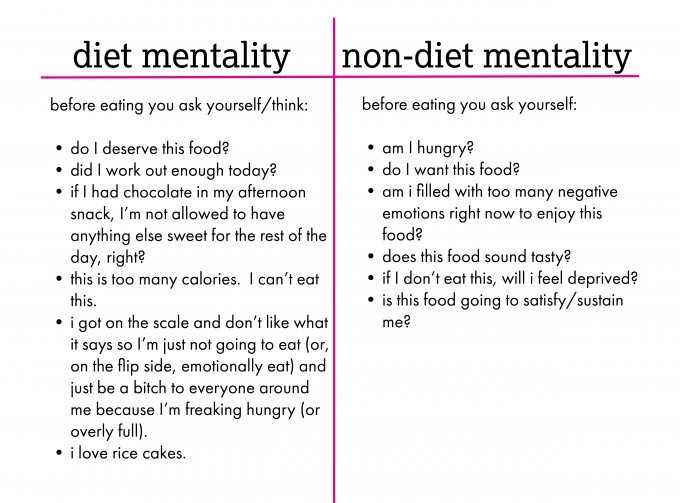
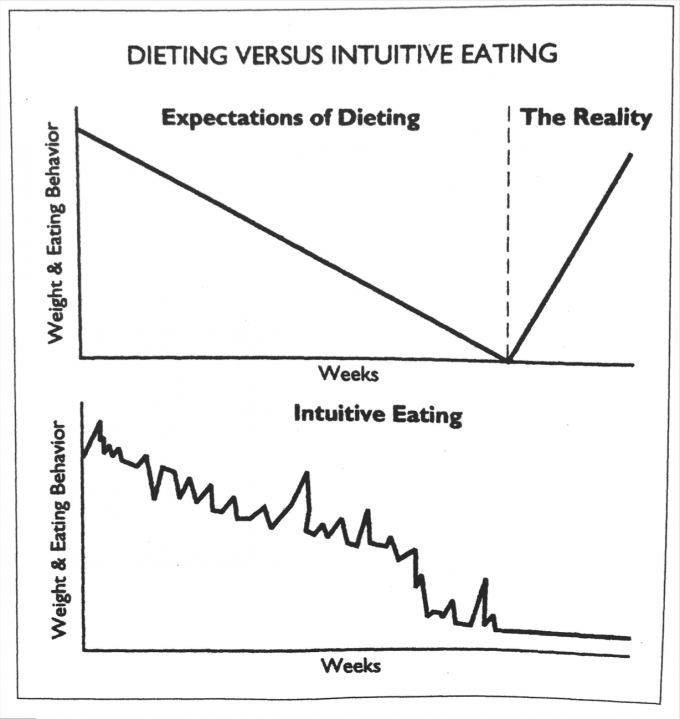
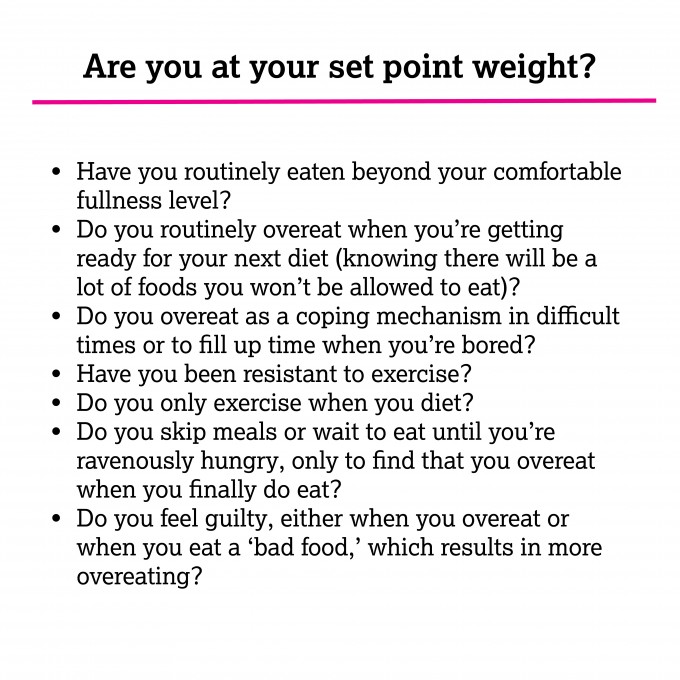
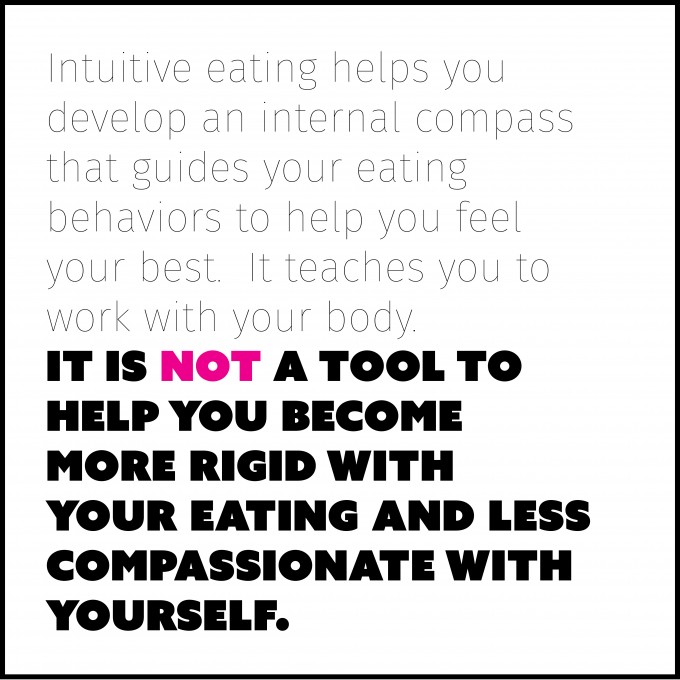
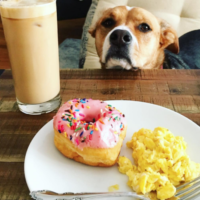
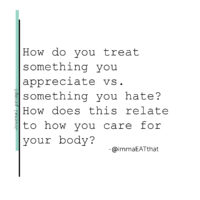
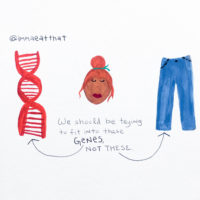

I really like the charts you have here. They help to sum up the information really well. I like how intuitive eating isn’t meant to be a weight loss plan, but a way to find our natural weight. It makes it accessible for people of all sizes. I try to keep an intuitive eating mindset, but with gut issues I can’t always trust my hunger levels.
Saving this post to review many times!
The Intuitive Eating Quiz is so neat and helpful. I loved taking it and reading the results. Had I taken it say 5ish to 8ish years ago, it would’ve resulted with something different. I’m really thankful that I continue to evolve into a more intuitive eater. This may sound silly, but after enjoying a mug of cereal last night, I decided to have our last piece of a Caramello bar because I was craving it. It’s all I needed but was very enjoyable. Allowing myself this treat felt great. :) I love being in this place now, and your blog is such a positive place to foster this for your readers!
Pinning this post to share with clients- I love how you write about intuitive eating <3 Thanks for sharing and have a great weekend!
Thanks, Jess!<3
Incredible post, Kylie!! Thank you for sharing such solid information in a kind and compelling way. Love it!!
pumpeddddddd for our upcoming coffee/breakfast/brunch date!
Love this post Kylie. I really do think intuitive eating is a great thing, and learning to eat in a way that satisfies our bodies; not with a mindset if we deserve the food is so important.
I love the intuitive eating approach and find freedom in using it’s principles. My question is, if you have a history of an eating disorder and your hunger cues are off, even after recovering, is this approach still do-able? I struggle with actually getting hungry and find myself “eating because it’s time” instead of when I get hungry because I may never get hungry.
Hey Megan! If you have been in the depths of an eating disorder, I would recommend working together with a dietitian to create a meal plan that allows your hunger and fullness cues to begin to come back. Sounds like you have a bit of ‘hunger silence’ right now. With eating disorders, you can NOT trust your fullness for a while.
This is a great post with tools for someone like me who is striving to turn my negative relationship with my body into a positive one. Thank you!!
This is my goal in life right now! I want so badly to be an intuitive eater, but I struggle BIG TIME with disordered eating thoughts. I get so frustrated with myself b/c I can’t get out of my own head….aaarrrggghhh!!! Reading your blog helps a lot with relieving some of the anxiety I feel about food/eating, so THANK YOU!
Keep surrounding yourself with positive messages! Podcasts: Recovery Warriors, Food Psych, Mind Body Musings –> ALL GREAT ONES!
over the years, i have learned to honor my hunger and listen to my body rather that what i am supposed to based on the diet or workout regimen. it has truly been eye opening..this was such a great resource esp the research aspect :)
I love the RDs for body confidence website!
I’m all about honoring and listening to your body. It’s definitely a practice and takes time but when you get in tune with it, it takes so much of that stress and negativity around food away.
Agreed. It’s like learning a new language. You have to practice to be good at it.
Yes to all of this. It has helped me so much.
I could not agree more! Especially love your “comes from a place of self-compassion, not self-hate” line. I research self-compassion and how it serves as a more sustainable motivator to engage in health-promoting behavior, so I’m pretty sure I’ve written that line verbatim at some point. ;) My passion is bringing this message to women/men, so I’m beyond enthused that you’re using your *incredibly* well-built platform to do so. Rock on girl!
I’m on instagram @theselfcompassionshift if anyone else wants to learn more about making this important mindset shift!
I started following you:) Thanks for the comment, Jocelyn!
Pingback: Top 3 Friday #18 – The Domestikated Life
This post is AMAZING. You are doing such a wonderful job with these posts lately Kylie! Please keep writing them, my hope is that dietitians that think like we do can help stop this dieting non-sense!
Pingback: A Little Somethin' Sunday #44 - Sinful Nutrition
Love that you’re posting this info! I discovered IE in 2012. I’d seen people “eating intuitively” online and wondered what they were doing. It took reading the book for me to understand that it wasn’t just an excuse to eat whatever you want (a lot of the people posting were just eating junk and I’m not sure they really got what the point of IE is).
Anyway, IE is scary at first, but I am here to tell you that I no longer worry about my weight after practicing IE (and no longer thinking about it). I’ve stayed the same weight +/- 3-4 pounds since 2012 (other then when I tried a different birth control, but that wasn’t IE’s fault!).
Pingback: lake weekend eats – Yeah…Immaeatthat
Pingback: Real Talk: The Hard Facts on Eating Disorders and How YOU Can Make A Difference – Nutrition Served Simply
I just want to say that I just found your site… and it is so inspiring in so many ways. I am in school to be a dietitian, and while food is my life and I do exercise regularly, I struggle with body image and used to engage in not-so-healthy behaviors. Reading through this reminded me that I AM doing what is healthy for me, I don’t have to be starving and unsatisfied to be doing the healthy thing. Now I am on to discover more of your site! :) Thank you.
Hi Amelia! Happy we found each other:) I’ll be watching for your name to pop up as you leave future comments! Have you checked out The Real Life RD blog as well? That is another great resource for TRULY healthy eating.
Pingback: Being a competent eater instead of eliminating food groups. – Yeah…Immaeatthat
Pingback: Last full week of training, my favorite restaurant salad combos + intuitive eating – Positively Whole
Pingback: The positive affirmations that help me most. – Yeah…Immaeatthat
Pingback: The phrase, “you have self control / discipline / willpower around food.” – Yeah…Immaeatthat
Pingback: Shattering the Health Halo of Diets - SATISFY NUTRITION
Pingback: Medically necessary diets and intuitive eating. – Yeah…Immaeatthat
Pingback: Questions to start your New Year. – Yeah…Immaeatthat
Pingback: My path to becoming an eating disorder dietitian. – Yeah…Immaeatthat
Pingback: My path to becoming an eating disorder dietitian. – immaEATthat